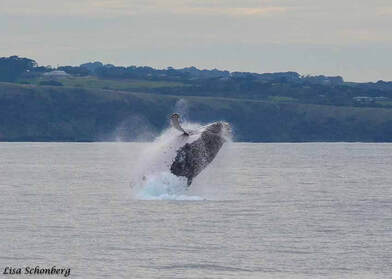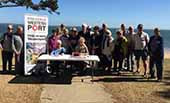 Once more the community has been forced to ward off an assault on Western Port by big business. Humpback whale breaches in the bay. Photo: Lisa Schonberg
Once more the community has been forced to ward off an assault on Western Port by big business. Humpback whale breaches in the bay. Photo: Lisa Schonberg THE AGL proposal to process imported gas in a floating gas factory in the RAMSAR-listed waters of Western Port was always an audacious attempt to take advantage of the ongoing national energy policy void.
This move in mid-2018 ignited an immediate response from the Phillip Island Conservation Society which commenced a campaign that continued right up to the recent announcement by Planning Minister Richard Wynne that the State Government would block the plan.
We also understood that we were up against a determined company with virtually unlimited resources. We needed lots of support to divide the workload of analysing reports and engaging the community. An alliance of environmental organisations was formed that included Save Westernport, the Victorian National Parks Association, Environment Victoria and the Westernport Protection Council.
| Ultimately it resulted in over 6000 submissions to the EES inquiry from community groups, councils, businesses and individuals. The unprecedented response has led to a unified movement of people opposed to the potential degradation of Western Port. Mr Wynne has now rejected the AGL proposal based on potential damage to marine ecosystems as a result of chlorine discharge, lower water temperature and entrainment. PICS argued strongly about those impacts in our submissions to the inquiry and we believe this decision is entirely appropriate. Nevertheless, in his report, the Minister has regarded as acceptable or not relevant many other potential adverse impacts of the AGL proposal on the environment, economy and the community. The argument against the necessity of gas importation was not a factor in rejecting the project. Nor was the impact on climate change or the greenhouse gas emissions from downstream gas consumption or upstream LNG extraction, transport or processing operations. Surprisingly the Minister’s report also dismissed concerns raised by many about the adverse impact on tourism, and stated impacts from operational noise and vibration, light spill, landscape and visual impacts, safety, hazards and risks. Impacts on connection to the natural environment, recreational fishing, boating, kayaking, swimming, walking and other social activities were either acceptable or could be managed by “environmental performance requirements”. |  Western Port defenders hailed November 7, 2019 - PICS president Jeff Nottle reflects on the role of activists in protecting the bay. Bay under threat - a timeline
|
Whilst the community reflects on what could have happened, PICS and the alliance will now switch focus to seeking more permanent protections for Western Port. As a minimum this will include seeking a single and dedicated strategic or management plan.
We also believe the marine spatial planning framework recently recognised by the Victorian Government as part of statewide marine and coastal policy should be explored for integrated and coordinated planning of Western Port.
The community should not have to bear the significant stress, costs and efforts to ward off ill-considered and opportunist initiatives to exploit and degrade Westernport without fully understanding the value of our natural world.
Jeff Nottle is president of the Phillip Island Conservation Society.